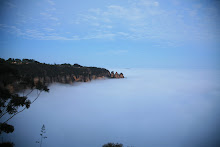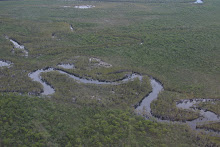
By Rich Bowden
Img: Air pollution. Credit: pfala/flickr
Fifteen leading Australian climate scientists have used the platform of a weekend newspaper article to hit back at what they see as creeping climate scepticism in the country's media and politics.
Declaiming doubters in an article in the Sydney Morning Herald on August 1 named "Climate Change Poised to Feed on Itself", the scientists contend that there exists irrefutable scientific evidence on the world's ongoing climate change that lead to "four conclusions."
1. They contend the world is warming. The group say "global average temperature has increased by about 0.8 degrees since 1850, with most of the increase occurring since 1950" and while agreeing that there are some natural fluctuations in temperature, the natural trend is rising.
The scientists back their claim by pointing to rises in sea temperatures and a reduction in the world's sea-ice and snow cover. They claim that climate sceptics' view that the world has cooled since 1998 as a "misrepresentations of the full data" contending that the climate temperature trend measured during this time is inexorably upward.
2. That the most important factor behind global warming is the dramatic increase since 1950 of atmospheric concentrations of greenhouse gases released by human activities, of which carbon dioxide (CO2) is the single most prevalent.
Critically the group assess this conclusion as being based on "... several independent lines of evidence, including basic physics, studies of climate changes in both in the geological past and in the industrial era, and finally – but far from solely – from the predictions of climate models. Together, these provide an overwhelming case that increasing greenhouse gas concentrations cause warming, and that CO2 is the largest contributor to the current warming trend."
3. The globe will continue to warm if nothing is done to restrict carbon emissions, and may even increase. The scientists state that if "business as usual" is continued, the planet may heat up to a nightmarish six degrees above current temperatures by the turn of the next century.
They warn of drastic rises in global temperatures as providing a "knock-on" effect with changing temperatures "...major disruptions to food supplies, river flows and water availability, significant and ongoing rises in sea level (of up to about a metre by 2100 and potentially metres over longer times), disease threats, disruptions to ecosystems including the extinction of many species, and social and geopolitical destabilisation."
4. That it will take many centuries to reverse the effects of climate change.
The group felt they needed to go public to refute many theories gaining prevalence in Australia that the world climate crisis is over and the globe is in fact cooling. Climate sceptics such as Senator Steven Fielding, who holds a vital balance of power vote in the coming carbon emissions trading scheme, has publicly declared himself a climate sceptic. His views have been endorsed by many in Australia's conservative parties as the Senate looks to debate the trading scheme within the next two weeks.
The group say they put their views in an article partly to refute these "unscientific" views from Australia's political right but also to hit back at popular misconceptions that the Earth is cooling or that any warming is caused by sunspots, not man-made activity.
The scientists, many who have worked on the subject of climate change for the United Nations, also warned of the inexorable approach of a number of climatic "tipping points" if nothing is done to curb carbon emissions, a state of affairs which had the potential to throw the world into a new, more serious state.
The group are: Michael Raupach and John Church, CSIRO; David Griggs, Amanda Lynch and Neville Nicholls, Monash University; Nathan Bindoff, Antarctic Climate and Ecosystems Co-operative Research Centre; Matthew England and Andy Pitman, University of NSW; Ann Henderson-Sellers and Lesley Hughes, Macquarie University; Ove Hoegh-Guldberg, University of Queensland; Roger Jones, Victoria University; David Karoly, University of Melbourne; and Tony McMichael and Will Steffen, Australian National University.
Img: Air pollution. Credit: pfala/flickr
Fifteen leading Australian climate scientists have used the platform of a weekend newspaper article to hit back at what they see as creeping climate scepticism in the country's media and politics.
Declaiming doubters in an article in the Sydney Morning Herald on August 1 named "Climate Change Poised to Feed on Itself", the scientists contend that there exists irrefutable scientific evidence on the world's ongoing climate change that lead to "four conclusions."
1. They contend the world is warming. The group say "global average temperature has increased by about 0.8 degrees since 1850, with most of the increase occurring since 1950" and while agreeing that there are some natural fluctuations in temperature, the natural trend is rising.
The scientists back their claim by pointing to rises in sea temperatures and a reduction in the world's sea-ice and snow cover. They claim that climate sceptics' view that the world has cooled since 1998 as a "misrepresentations of the full data" contending that the climate temperature trend measured during this time is inexorably upward.
2. That the most important factor behind global warming is the dramatic increase since 1950 of atmospheric concentrations of greenhouse gases released by human activities, of which carbon dioxide (CO2) is the single most prevalent.
Critically the group assess this conclusion as being based on "... several independent lines of evidence, including basic physics, studies of climate changes in both in the geological past and in the industrial era, and finally – but far from solely – from the predictions of climate models. Together, these provide an overwhelming case that increasing greenhouse gas concentrations cause warming, and that CO2 is the largest contributor to the current warming trend."
3. The globe will continue to warm if nothing is done to restrict carbon emissions, and may even increase. The scientists state that if "business as usual" is continued, the planet may heat up to a nightmarish six degrees above current temperatures by the turn of the next century.
They warn of drastic rises in global temperatures as providing a "knock-on" effect with changing temperatures "...major disruptions to food supplies, river flows and water availability, significant and ongoing rises in sea level (of up to about a metre by 2100 and potentially metres over longer times), disease threats, disruptions to ecosystems including the extinction of many species, and social and geopolitical destabilisation."
4. That it will take many centuries to reverse the effects of climate change.
The group felt they needed to go public to refute many theories gaining prevalence in Australia that the world climate crisis is over and the globe is in fact cooling. Climate sceptics such as Senator Steven Fielding, who holds a vital balance of power vote in the coming carbon emissions trading scheme, has publicly declared himself a climate sceptic. His views have been endorsed by many in Australia's conservative parties as the Senate looks to debate the trading scheme within the next two weeks.
The group say they put their views in an article partly to refute these "unscientific" views from Australia's political right but also to hit back at popular misconceptions that the Earth is cooling or that any warming is caused by sunspots, not man-made activity.
The scientists, many who have worked on the subject of climate change for the United Nations, also warned of the inexorable approach of a number of climatic "tipping points" if nothing is done to curb carbon emissions, a state of affairs which had the potential to throw the world into a new, more serious state.
The group are: Michael Raupach and John Church, CSIRO; David Griggs, Amanda Lynch and Neville Nicholls, Monash University; Nathan Bindoff, Antarctic Climate and Ecosystems Co-operative Research Centre; Matthew England and Andy Pitman, University of NSW; Ann Henderson-Sellers and Lesley Hughes, Macquarie University; Ove Hoegh-Guldberg, University of Queensland; Roger Jones, Victoria University; David Karoly, University of Melbourne; and Tony McMichael and Will Steffen, Australian National University.




.jpg)

.jpg)
No comments:
Post a Comment